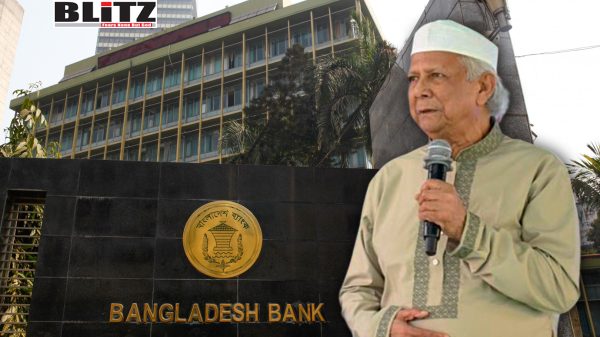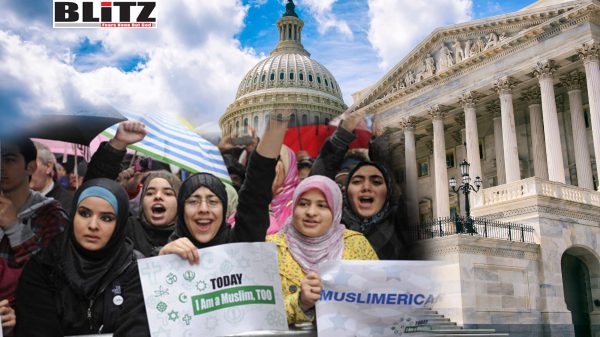Sharia rule creeps into Bangladesh: Central bank’s veil directive sparks alarm
- Update Time : Thursday, July 24, 2025

Just days after Mufti Syed Muhammad Rezaul Karim (popularly known as Mufti Fauzul Karim), the influential pir of Chormonai and head of the ultra-Islamist group Islami Shashontontro Andolon (Islamic Constitutional Movement), made a chilling proclamation calling for the replacement of democracy in Bangladesh with Sharia-based Taliban-style rule, the nation is witnessing alarming institutional developments that align with this radical agenda. While this shocking statement should have drawn national and international condemnation, it instead appears to have emboldened Islamist forces within the administration, particularly under the shadow leadership of Muhammad Yunus.
On July 21, 2025, the Human Resources Department of Bangladesh Bank, the country’s central financial authority, issued a formal directive mandating specific Islamic dress codes for its employees, particularly women. The new rules require female staff members to wear sarees or salwar-kameez, cover their heads with scarves or hijab, and avoid short-sleeved or short-length clothing, leggings, or any form of Western attire. Although not mandatory in wording, the circular “encourages” women to wear the burqa – an unmistakable push toward enforcing religious attire.
For male employees, the instructions discourage wearing jeans or gabardine trousers and recommend only formal shirts (long or half-sleeved) with appropriate formal footwear.
In an interview with Prothom Alo, Bangladesh Bank Executive Director and Spokesperson Arif Hossain Khan attempted to downplay the imposition, saying:
“Each batch brings in 200–250 new recruits, many straight out of university. Some still behave as though they’re on campus. After observing this for some time, a dress code was issued for the sake of decorum. This applies only to office hours – outside of work, employees are free to wear what they like.”
However, many observers see through this pretext. The directive explicitly warns that failure to comply will result in disciplinary action – a clear sign of coercion under the guise of “formality”.
The development has sparked concern among rights activists. Bangladesh Mahila Parishad President Fawzia Moslem expressed disbelief at the directive, stating:
“I have never seen such a directive from a government institution before. This is part of a broader attempt to reshape our cultural environment and social norms. It’s not just about clothing – it’s about imposing a worldview”.
She further warned that institutionalizing such practices risks marginalizing women and minorities and moving Bangladesh closer to religious authoritarianism.
A senior official within Bangladesh Bank, speaking to this writer on condition of anonymity, revealed that the dress code directive is just the tip of the iceberg. Over the past several months, senior officials – many known for their Islamist leanings – have been actively encouraging their subordinates to perform group prayers during office hours, grow beards, and adopt Arab-style attire. Non-Muslim and secular employees, particularly from religious and ethnic minorities, are being quietly removed from key positions or denied promotions under vague pretexts.
The official warned that “a slow but dangerous transformation” is taking place, turning public institutions into religiously conformist spaces and promoting intolerance under an administrative cover.
These developments are unfolding under the patronage and ideological influence of Nobel Laureate Muhammad Yunus, whose deep connections with the Western liberal elite have helped shield him from criticism. Yunus, widely regarded as the architect behind Bangladesh’s current illegitimate regime installed through a controversial, voter-less election, appears to be using his position to lay the foundation of a so-called “Second Republic” – one governed by Sharia principles, religious uniformity, and autocracy.
According to multiple insiders, Yunus is working in coordination with Islamist leaders like Mufti Karim and transnational Islamist networks to transform Bangladesh’s secular governance into a theocratic regime, all while maintaining a façade of legitimacy through Western endorsements.
The situation bears disturbing similarities with Taliban-ruled Afghanistan. In May 2022, the Taliban issued a decree requiring women to wear head-to-toe burqas, allowing only the eyes to remain visible. Those who failed to comply were often punished brutally.
According to an investigative report by Rukshana Media, Taliban morality police are using electric shocks on Afghan women accused of violating hijab mandates – some even being knocked unconscious during arrests. Other reports from women’s prisons describe widespread use of electroshock devices to force compliance.
Now, the echoes of such brutal practices are being heard in Bangladesh, not yet in the form of physical punishment, but in the institutionalization of religious conformity. The dress code issued by Bangladesh Bank – although not (yet) enforced violently – represents the first bureaucratic step in what could evolve into full-scale state-imposed religious policing.
What makes this development even more troubling is the continued silence of the international community, particularly the United States and European Union. Ironically, while the United Nations expresses concern over the Taliban’s draconian dress-code enforcement, it remains conspicuously silent as similar trends take root in Bangladesh – a country that once prided itself on its secular constitution.
This silence is not accidental. The Biden administration, along with globalist elites such as the Clintons, Barack Obama, and George Soros, were instrumental in backing the current regime in Dhaka. Their protégé, Muhammad Yunus, was empowered not only to suppress political dissent but to reshape the ideological foundation of Bangladesh. The Western liberal establishment has effectively traded democratic values for political expediency, allowing a soft-Caliphate to rise in South Asia under their watch.
Bangladesh now stands at a perilous crossroads. With the central bank adopting Taliban-inspired dress codes, minorities being sidelined, and state institutions subtly radicalized, the dream of a secular, inclusive, democratic Bangladesh is fading fast.
This is not just a domestic issue – it has serious regional and global implications. A Sharia-ruled Bangladesh would serve as a breeding ground for radicalism, posing threats to neighboring India and Southeast Asia, while destabilizing global efforts to counter extremism.
If the world remains silent now, history will remember this as the moment the second-largest Muslim democracy was transformed into a totalitarian theocracy under the cloak of bureaucracy and Western complicity. Bangladesh is no longer on the edge of Islamofascism – it is already sliding deep into it. Only a unified national and international pushback can halt this dangerous descent into darkness.










